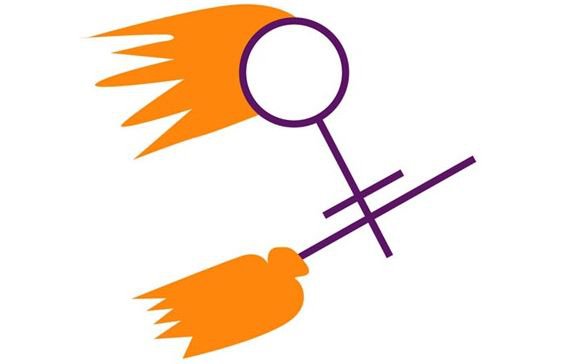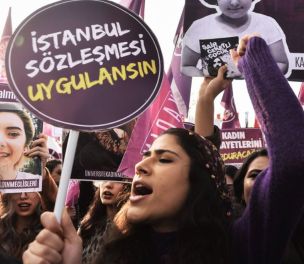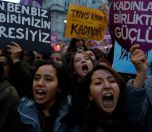Flying Broom Foundation calls on Google to make İstanbul Convention doodle on August 1

Click to read the article in Turkish
While senior figures from the ruling Justice and Development Party (AKP) and conservative circles have been targeting the İstanbul Convention, women continue to defend it.
The AKP is expected to announce its decision about the convention after its central executive committee meeting on August 5. Meanwhile, women are trying to make their voices heard both on the streets and social media.
As part of these efforts, the Flying Broom Foundation called on Google to make a doodle for the İstanbul Convention on August 1, the day it came into force.
Google previously made doodles for feminist author Duygu Asena and Turkish classical music singer Safiye Ayla, as well as for the country's national holidays.
1 Ağustosta İstanbul Sözleşmesi Doodle olsun! #HeyGoogle @Google#İstanbulSözleşmesiYaşatır pic.twitter.com/Wwe6ZUoyJx
— Uçan Süpürge Vakfı-Flying Broom (@ucansupurgeukff) July 30, 2020
About İstanbul Convention
* Source: CoE The Council of Europe (CoE) "Convention on Preventing and Combating Violence Against Women and Domestic Violence", also known as "İstanbul Convention", is based on the understanding that violence against women is a form of gender-based violence that is committed against women because they are women. It is the obligation of the state to fully address it in all its forms and to take measures to prevent violence against women, protect its victims and prosecute the perpetrators. As of March 2019, it has been signed by 45 countries and the European Union (EU). On March 12, 2012, Turkey became the first country to ratify the Convention, followed by 33 other countries from 2013 to 2019 (Albania, Andorra, Austria, Belgium, Bosnia and Herzegovina, Croatia, Cyprus, Denmark, Finland, Estonia, France, Georgia, Germany, Greece, Iceland, Ireland, Italy, Luxembourg, Malta, Monaco, Montenegro, the Netherlands, Norway, North Macedonia, Poland, Romania, Portugal, San Marino, Serbia, Slovenia, Spain, Sweden, Switzerland). The Convention came into force on 1 August 2014. * Click here to read the full convention |
From İstanbul ConventionThe purposes, definitions and general obligations of the İstanbul Convention have been indicated in its first chapter of the as follows: Chapter I – Purposes, definitions, equality and non-discrimination, general obligations Article 1 – Purposes of the Convention The purposes of this Convention are to: a) protect women against all forms of violence, and prevent, prosecute and eliminate violence against women and domestic violence; b) contribute to the elimination of all forms of discrimination against women and promote substantive equality between women and men, including by empowering women; c) design a comprehensive framework, policies and measures for the protection of and assistance to all victims of violence against women and domestic violence; d) promote international co-operation with a view to eliminating violence against women and domestic violence; e) provide support and assistance to organisations and law enforcement agencies to effectively co-operate in order to adopt an integrated approach to eliminating violence against women and domestic violence. In order to ensure effective implementation of its provisions by the Parties, this Convention establishes a specific monitoring mechanism. Article 2 – Scope of the Convention This Convention shall apply to all forms of violence against women, including domestic violence, which affects women disproportionately. Parties are encouraged to apply this Convention to all victims of domestic violence. Parties shall pay particular attention to women victims of gender-based violence in implementing the provisions of this Convention. This Convention shall apply in times of peace and in situations of armed conflict. Article 3 – Definitions For the purpose of this Convention: a) "violence against women" is understood as a violation of human rights and a form of discrimination against women and shall mean all acts of gender-based violence that result in, or are likely to result in, physical, sexual, psychological or economic harm or suffering to women, including threats of such acts, coercion or arbitrary deprivation of liberty, whether occurring in public or in private life; b) "domestic violence" shall mean all acts of physical, sexual, psychological or economic violence that occur within the family or domestic unit or between former or current spouses or partners, whether or not the perpetrator shares or has shared the same residence with the victim; c) "gender" shall mean the socially constructed roles, behaviours, activities and attributes that a given society considers appropriate for women and men; d) "gender-based violence against women" shall mean violence that is directed against a woman because she is a woman or that affects women disproportionately; e) "victim" shall mean any natural person who is subject to the conduct specified in points a and b; f) "women" includes girls under the age of 18. Article 4 – Fundamental rights, equality and non-discrimination Parties shall take the necessary legislative and other measures to promote and protect the right for everyone, particularly women, to live free from violence in both the public and the private sphere. Parties condemn all forms of discrimination against women and take, without delay, the necessary legislative and other measures to prevent it, in particular by: –embodying in their national constitutions or other appropriate legislation the principle of equality between women and men and ensuring the practical realisation of this principle; –prohibiting discrimination against women, including through the use of sanctions, where appropriate; –abolishing laws and practices which discriminate against women. The implementation of the provisions of this Convention by the Parties, in particular measures to protect the rights of victims, shall be secured without discrimination on any ground such as sex, gender, race, colour, language, religion, political or other opinion, national or social origin, association with a national minority, property, birth, sexual orientation, gender identity, age, state of health, disability, marital status, migrant or refugee status, or other status. Special measures that are necessary to prevent and protect women from gender-based violence shall not be considered discrimination under the terms of this Convention. Article 5 – State obligations and due diligence Parties shall refrain from engaging in any act of violence against women and ensure that State authorities, officials, agents, institutions and other actors acting on behalf of the State act in conformity with this obligation. Parties shall take the necessary legislative and other measures to exercise due diligence to prevent, investigate, punish and provide reparation for acts of violence covered by the scope of this Convention that are perpetrated by non-State actors. Article 6 – Gender-sensitive policies Parties shall undertake to include a gender perspective in the implementation and evaluation of the impact of the provisions of this Convention and to promote and effectively implement policies of equality between women and men and the empowerment of women. |
(EMK/VK)










